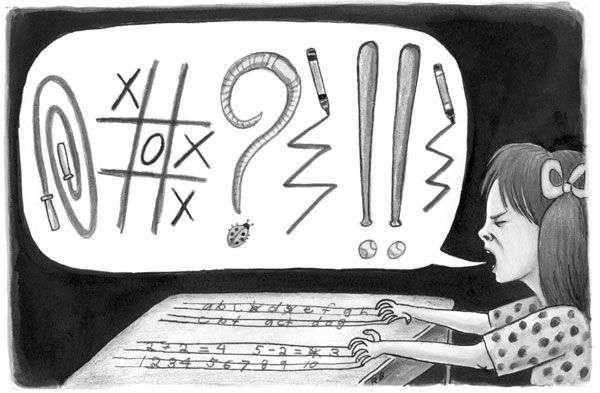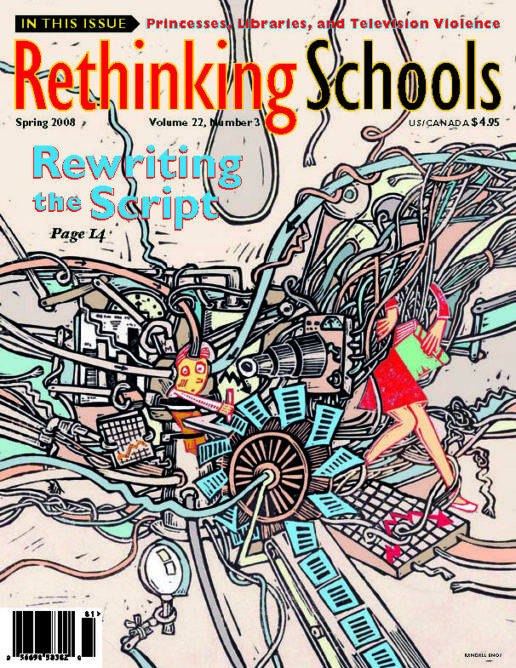The Scripted Prescription
A cure for childhood
Illustrator: Roxanna Bikadoroff

A few days before my daughter Vivian started pre-kindergarten at a Portland public school, she was asked to come in and be tested. As part of the test, the teacher asked Vivian to write her name on a piece of paper. My 4-year-old daughter looked up at me with huge, puzzled eyes. I looked at the teacher with equally huge, puzzled eyes. Write her name? On the first day of pre-kindergarten? Vivian didn’t know how to hold a pencil, much less write her name.
Traditionally, or so I’ve been told, the first meeting has been a time for the new student and the teacher to get to know each other. But there was no conversation about what Vivian liked to read, what she liked to do, or anything else that might have given the teacher some insight into Vivian. Her teacher appeared to believe all that she needed to know about Vivian could be discovered from this test. It saddened me to think that my daughter’s first impression of school was based on taking a test and failing it.
Now, Vivian regularly brings home worksheets that she did in school — photocopies of activities like sorting, graphing, letter tracing, and letter recognition. She’s very busy at school. The first 45 minutes or so of class is open, but it’s surprisingly structured and fettered. The kids often work alone. There’s not much in the way of spontaneous expression or originality and no time for them to engage in non-adult-supervised open-ended play situations or unstructured, whole-body activities. They have several areas set up for them — a puzzle here, a set of crayons and coloring books there.
Yet, there is little to no noise.
After the initial 45 minutes, the teacher has the students working in “centers.” Each center is focused on a specific task, usually associated with a literacy skill. According to the teachers I’ve spoken to, these skills were the sorts of things that 6- and 7-year-olds used to do in 1st grade. Now 4- and 5-year-olds are being asked to do them in pre-kindergarten.
Next year, if Vivian stays at this school and attends kindergarten, she will be in school all day and she will be even busier. As a kindergartner, she will have exactly 20 minutes of recess, and then she’ll get back to work.
I met with the principal and with Vivian’s teacher. I expressed my concern that this practice might not be developmentally appropriate, i.e., some kids are just not ready for a heavy dose of academics and skills. The principal looked at me, rolled her eyes, and said calmly and confidently, “Well, it’s not going to do them any harm.”
I’m not so sure. Should we place such a heavy emphasis on academic skill development at such an early age? Is this a developmentally appropriate practice? The truth is, we don’t know. That’s because this heavy skills-based, academic approach has never been taken before in pre-K and kindergarten classrooms in this country. So there simply are no long-term data. Yet the lack of data on long-term effects has not stopped us from forging full steam ahead. Proponents of this approach think this emphasis on academic achievement is good for very young children. But we don’t actually know what effect it’s having, nor do we know what effect it will have five, 10, or 15 years from now.
Where I’m from, we call this “driving with your eyes closed.” Others call it hoping. Call it what you will, but the fact of the matter is that our children in public schools — my daughter included — are participating in a giant experiment that none of us agreed to. Our children are guinea pigs, to put it nicely. Others might call them lab rats.
My daughter came home the other day in an incredibly grumpy mood.
“How was school today?” I asked.
“Terrible,” she answered.
“Why? What happened?”
“I want to play with my friends,” she said.
“Don’t you get a chance to play with your friends?”
“No,” she replied.
To be honest, it’s not so much the addition of academics that worries me, as it is the subtraction of everything else. We seem to have lost the balance here. What are we getting rid of to make more time for all this skill building? Art, music, foreign languages, and — yes — recess are being cut to make more time for skills, specifically math and reading skills. Starting in pre-K.
So I met with a district administrator at the Office of Teaching and Learning. I said to her: “Ideally for me, pre-K can be about play, socialization, and fun. I think we can introduce some early literacy and numeracy in kindergarten, but let’s wait until 1st grade to get into formal instruction.”
She replied, “Oh, no. That would be too late.”
“Too late?” I asked. “Too late for what?”
The truth is, I’m not in a hurry. Neither is my daughter. But kids are being pushed to be super-achievers at earlier and earlier ages. The rush to make adequate yearly progress (AYP) under No Child Left Behind has only exacerbated this trend that David Elkind chronicled in his 1981 book, The Hurried Child.
Elkind argues that in blurring the boundaries of what is age-appropriate by expecting — or imposing — too much too soon, we force our kids to grow up far too fast. He referred to it as nothing less than an assault on childhood.
I’m worried that we’re setting kids up to fail. We may succeed in getting some of them to read, write, and complete math equations precociously. But we may also be creating a cohort of 4- and 5-year-old children who look at school as a place where they simply don’t belong. As a place that is devoid of fun. I’m concerned that children like my daughter are forming a negative self-image when asked to perform cognitive tasks when they are clearly not able or not comfortable doing so. Children may not only form negative self-images and develop negative self-esteem, but they may also form negative impressions about school, e.g., it’s too competitive, too stressful.
Competition and stress may or may not be something we want kids to learn to deal with. And I’m not one of those parents who wants to shield my little shnoogums from nasty people who don’t think she’s as marvelous as I do. But do we really want 4-year-olds to deal with these things in pre-K, in the grade before the beginning grade of elementary school? When are children ever allowed to be beginners? Surely pre-kindergarten is a good place for kids to be beginners. Or so we used to think.
The notion of children being “kindergarten ready” is a bizarre oxymoron. It’s like saying you have to know how to play the piano before you can learn how to play the piano. But if you are not “kindergarten ready,” then you are considered behind. How odd that a policy called “No Child Left Behind” can define children as “behind” on their very first day of school.
Children learn to play together by playing together. They learn how take turns by taking turns, how to share by sharing, how to resolve conflicts that come up by resolving conflicts that come up. In order to learn how to do these things, children need to experience them firsthand. They need to do these things. But if they are not being given the time to do them, then how are they supposed to learn them?
In the context of the educational assessments that children like Vivian are subject to, we see a diagnostic model that specializes in both quantifying educational deficiencies in very young children and providing an antidote that meets the needs of the diagnosis. We see the emergence of large publishing companies that control the definition of the symptoms as well as prescribe and furnish the cure — for a hefty price. We see the emergence of the scripted curriculum, where “scripted” means an explicit formula to cure what ails them, as in “prescription.” The prescription goes by various names, but they all have this in common: invent, identify, and remediate deficiencies, all in one slick package.
So what do I want? I want what Vivian wants: to be able to spend time with her friends, playing and being a little kid. She doesn’t have any kids to play with on her block, so school is the only place she has any chance to socialize and interact with her peers. I want her to have the chance to make friends. I want her to be given the opportunity to play. I want her to learn how to share and solve problems with her peers. I want this more than I want her to be phonemically aware. There will be time for such academic pursuits when she’s a bit older. But there’s only so much time she’s allowed to be a little girl.
Lest you think this sounds a bit touchy-feely and out of synch with today’s calls for accountability, let me remind you of this: A 2004 study by the Paris-based Organization of Economic Cooperation and Development looked at literacy and reading skills for 15-year-olds. Finland was the top-ranked producer of readers. The United States was 15th out of 30 countries surveyed.
So what does Finland do? Children in Finland start learning to read in the 1st grade. The Finns believe that play is the most effective learning tool in the early years and sets the stage for a lifelong love of learning.
I want this for all young children, not just my daughter. I want all children to have the opportunity to develop intellectually, socially, and emotionally. But most importantly, I want children to be allowed to have childhoods.

